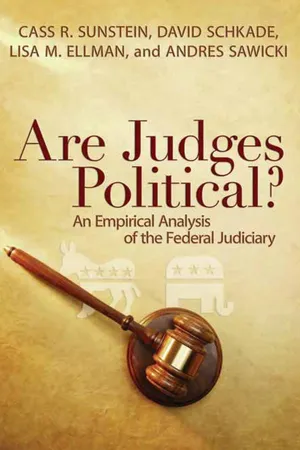
Are Judges Political?
An Empirical Analysis of the Federal Judiciary
- 177 pages
- English
- PDF
- Available on iOS & Android
Are Judges Political?
An Empirical Analysis of the Federal Judiciary
About This Book
Over the past two decades, the United States has seen an intense debate about the composition of the federal judiciary. Are judges "activists"? Should they stop "legislating from the bench"? Are they abusing their authority? Or are they protecting fundamental rights, in a way that is indispensable in a free society? Are Judges Political? cuts through the noise by looking at what judges actually do. Drawing on a unique data set consisting of thousands of judicial votes, Cass Sunstein and his colleagues analyze the influence of ideology on judicial voting, principally in the courts of appeal. They focus on two questions: Do judges appointed by Republican Presidents vote differently from Democratic appointees in ideologically contested cases? And do judges vote differently depending on the ideological leanings of the other judges hearing the same case? After examining votes on a broad range of issues--including abortion, affirmative action, and capital punishment--the authors do more than just confirm that Democratic and Republican appointees often vote in different ways. They inject precision into an all-too-often impressionistic debate by quantifying this effect and analyzing the conditions under which it holds. This approach sometimes generates surprising results: under certain conditions, for example, Democrat-appointed judges turn out to have more conservative voting patterns than Republican appointees. As a general rule, ideology should not and does not affect legal judgments. Frequently, the law is clear and judges simply implement it, whatever their political commitments. But what happens when the law is unclear? Are Judges Political? addresses this vital question.
Frequently asked questions
Information
Table of contents
- Front Cover
- Front Flap
- Title Page
- Copyright Information
- Table of Contents
- Preface
- Studying Judges with Numbers
- Ideological Votes and Ideological Panels
- Nonideological Voting and Entrenched Views
- Explaining the Data: Conformity, Group Polarization, and the Rule of Law
- The Case of Big Decisions: Of Segregation, Abortion, and Obscenity
- More Conservative than Thou? Judicial Voting across Circuits, across Presidents, and over Time
- What Should Be Done? Of Politics, Judging, and Diversity
- Conclusion: Law and Politics: A Mixed Verdict
- Notes
- Index
- Back Flap
- Back Cover